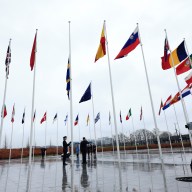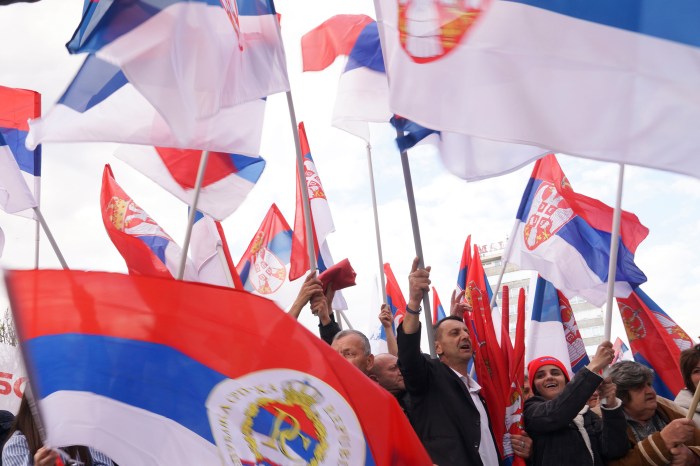VANCOUVER – Tessa Virtue and Scott Moir have made history, winning Canada’s first Olympic gold medal in ice dance.
The couple captured the gold with a stirring free dance performance to Gustav Mahler’s “Symphony No. 5” at the Vancouver Winter Games on Monday.
Virtue, from London, Ont., and Moir, from Ilderton, Ont., edged American training partners Meryl Davis and Charlie White and reigning world champions Oksana Domnina and Maxim Shabalin of Russia.
The Canadians finished with 221.57 total points in their Olympic debut. White and Davis had 215.74 for the silver and the Russians scored 207.64 to take the bronze.
“Oh my God, it’s the moment we’ve dreamed of,” said Moir. “It’s everything we’ve dreamed of. We couldn’t be happier.”
Virtue, 20, and Moir, 22, are also the first North Americans to capture ice dance gold.
They punctuated their free program with a breathtaking lift known as The Goose.
“We were very focused coming in. We knew this program was trained, we knew we were ready and we knew we were confident in that,” Virtue said. “It was just about skating together and skating in our hearts and enjoying the moment for us and skating for the two of us. We’re so proud to be Canadian and to do it for the nation.”
It’s the first figure skating medal for Canada at the Vancouver Games and first Olympic gold since Jamie Sale and David Pelletier shared the pairs title eight years ago in Salt Lake City.
Moir said it took awhile for the moment to sink in.
“I can honestly say that I didn’t feel that until the very last position, and when I looked at Tess it was just like it was walking into the opening ceremonies,” Moir said. “It just felt like the moment was happening and everything was in slo-mo, and I wasn’t even reacting, I wanted to be way more excited than that but it just happened. And we were so excited.”
Davis and White skated to “Phantom of the Opera” while the Russians performed to “The Double Life of Veronique.”
“We are happy with our performance, and we handled our nerves, and it was a very long and hard way to this medal and now we are happy and a little bit tired,” Shabalin said. “In general it was OK, we are happy we skated clean without mistakes because it’s always very hard pressure in the Olympics, and the main goal was to do everything clean and without mistakes.”
When asked if the first-ever Olympic ice dance gold by a North American duo signalled a shift in the sport’s traditional power base, Shabalin replied: “I think it’s only because a lot of Russian coaches, and sportsman, skaters, moved to North America since 10 years, and now you know it’s in the opposite direction.
“Everyone’s coming back,” he added with a laugh.
In a discipline long dominated by Russians, Virtue and Moir lead a group of young ice dance teams that have thrived under the new judging system implemented in 2004 to eradicate the partisan judging that had been a big black on the sport — ice dancing in particular.
Their athleticism was on spectacular display at the Pacific Coliseum as they thrilled the crowd with a series of intricate spins and nervy lifts. Their Goose lift — they came up with the name after an American skater suggested they call it The Eagle — is sure to go down as of the most enduring snapshots of skating at these Games. In the lift, Virtue balances on one knee on Moir’s crouching back, her arms outstretched like a bird, before spilling into her partner’s arms.
Vanessa Crone of Aurora, Ont., and Paul Paurier of Unionville, Ont., finished 14th with a total of 164.60 points. They received huge cheers from the crowd for their performance to “Nocturne” and “Bohemian Rhapsody.”
Virtue and Moir, who have been skating together for 13 years and won bronze at last year’s world championships, are fortunate to blaze an Olympic ice dance trail that other skaters before them found blocked.
In a discipline long fraught with controversy and marred by corrupt judging, Canada had won just one ice dance medal since the sport was added to the Olympic program in 1976 — bronze by Tracy Wilson and Rob McCall in 1988 in Calgary.
Canadians Shae-Lynn Bourne and Victor Kraatz were four-time world bronze medallists, from 1996 to ’99, but never climbed onto the Olympic podium.
“It used to be you liked somebody, you disliked somebody, or you favoured a certain country over another country, then that’s who would win,” Kraatz told The Canadian Press. “If you were a four-time world champion, well you’re going to win automatically the Olympic Games.”
Russian or Soviet skaters had won all but two Olympic golds — Jayne Torvill and Christopher Dean of Britain in ’84, and Marina Anissina and Gwendal Peizerat of France in 2002.
The young Canadians’ performance Monday was all the more remarkable considering at this time last year, Virtue and Moir had been off the competitive ice for months. Virtue underwent surgery on both her legs to alleviate chronic pain in her shins, and Moir was forced to train alone, hoisting a sandbag or a hockey stick as a makeshift partner while Virtue stayed home to heal. They missed the entire Grand Prix season, but managed to bounce back for a medal at the worlds in Los Angeles.
Skate Canada officials were gunning for three medals in Vancouver, but Patrick Chan finished fifth in men’s singles while Jessica Dube and Bryce Davison were sixth in pairs.
Reigning world silver medallist Joannie Rochette begins her difficult quest for an Olympic medal Tuesday with the women’s short program, less than three days after her mom Therese died of a heart attack in Vancouver.


















